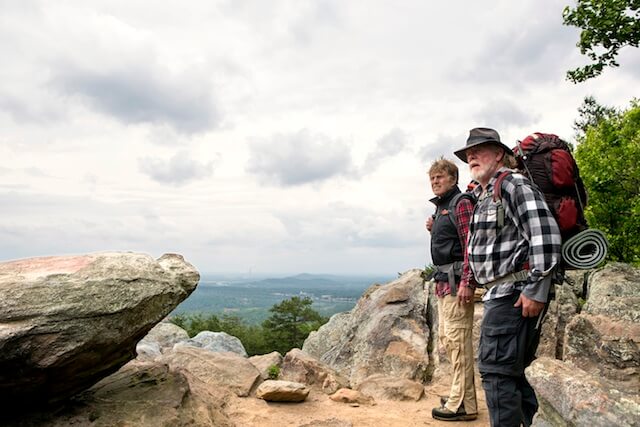‘A Walk in the Woods’ “A Walk in the Woods” should be one of those — those safe, cuddly, offensively inoffensive old person movies, like “Last Vegas” and “The Bucket List.” These films repurpose legends, and in this case it’s Robert Redford and Nick Nolte, seen attempting to conquer the 2,000-some miles of the Appalachian trail. It boasts barndoor broad jokes and all the visual flair of a modern sitcom. (Ken Kwapis, who also made films as diverse as “Dunston Checks In” and “He’s Just Not That Into You,” is a TV vet who’s fond of obvious sound stages.) But if it’s not profound it is wise, and in subtle, casual ways, and it avoids a lot of the heinous tropes of the genre. There are no Viagra jokes but, more importantly, there also few easy reassurances. Like “Grandma” and “Danny Collins,” it represents a shift in geriatric cinema away from treating aging with kid gloves and towards a focus on regret, mortality and the fact that the body, eventually, utterly fails us. Even the premise is steeped in existential dread. Redford plays Bill Bryson — yes, that Bill Bryson, whose non-fiction missives are both milquetoast and unsparing in their reflections on humankind’s insignificance. “A Walk in the Woods,” based on his book, acts the same way. Flummoxed by a string of funerals, Redford’s Bill decides to prove his vitality by embarking on one of America’s more strenuous adventures, one that can defeat the young, let alone the increasingly enfeebled. The only one crazy enough to join him is Stephen (Nick Nolte), the most reprobate of his old friends, who shows up as, well, Nick Nolte: a hot mess in frayed clothes, prone to walking into doors and gulping down pancakes like a hyperactive infant. Not only have the rascally Stephen and the bookish Bill drifted apart, but Stephen can barely even walk, even when the trail doesn’t go vertiginously uphill. RELATED: Mary Steenburgen talks “A Walk in the Woods” and says most movies about aging are too “joke-filled” What follows is a deceptively nice, old person twist on Kelly Reichardt’s “Old Joy,” about two 30-something friends failing to reconnect on another, more manageable hike. This one ends in happier place, of course, and there is a preponderance of wacky, crowd-pleasing episodes, set to a score that’s either “fun” or soapy. But these interludes don’t go too far into the silly, and this is still Redford and Nolte they’re happening to. It’s perversely thrilling to see the serious, earnest Redford do light comedy for a change, in part because he’s good at it. He imbues a charming intelligence to scenes of joke-cracking and one where they escape a jilted husband after Stephen’s hide, and he has the best side-eye in the business. Nolte, meanwhile, cannot be contained. The former Sexiest Man Alive is happy making mouth noises and shambling about Mother Nature — a pig at peace scrounging about in his own mess. The film isn’t good enough for these titans, but it’s smarter and more melancholic and deeper than it often lets on. At one point they encounter an annoying hiker (Kristen Schaal) they’re quick to elude. It’s played for laughs, but afterwards Stephen reflects that they’ve effectively left her alone in a place that doesn’t always take kindly to loner women. Later Bill shares a connection with a lonely, personable motelier (Mary Steenburgen). He would never cheat on his sometimes disapproving wife (Emma Thompson), and Steenburgen disappears from the narrative as quickly as she entered it, never to be mentioned again. At times like this we’re encouraged to think about irrelevance, not only the big cosmic kind but the smaller one as well — that even someone as open-minded and drowning in degrees and awards as Bill Bryson would have to realize that moments of sparkage like that make life seem bigger, fraught with possibility, but also smaller, because these are so many roads like it we never take. That may sound Hallmark card-ish, but the idea of failure and embracing limitations underscores every lighthearted misadventure, and the epiphanies tends to be small, not major and definitely not triumphant. The abrupt way it ends may be the best thing about it — a sign that it’s both gentler and more tough than the wacky olds-in-the-woods movie it ostensibly is.
Director: Ken Kwapis
Stars: Robert Redford, Nick Nolte
Rating: PG-13
3 (out of 5) Globes
‘A Walk in the Woods’ is more than a wacky old person comedy

Broad Green Pictures
Follow Matt Prigge on Twitter @mattprigge

















